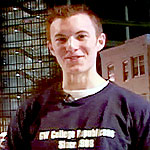U.S. citizens are granted the right to vote at age 18, but not every person exercises that right. American college campuses have a history of political activism that was particularly strong during the civil rights era. While political involvement continues on campuses today, it does not always translate into high numbers at the polls.
 |
| Chris Brooks |
"It's a couple minutes before six a.m. in the morning, and ... we're going to go campaign for Doug Forrester, gubernatorial candidate for New Jersey," said Chris Brooks, an American college student who is not taking Saturday off.
It's a few days before November's Election Day, and, as a member of the College Republicans at George Washington University in Washington, Mr. Brooks wants to get fellow Republican Doug Forrester elected.
"The big part of College Republicans across the country is grass-roots campaigning," he said. "It's something we love to do."
So much so that about 40 students showed up to travel five hours to New Jersey to knock on people's doors. Three days later, their political rivals, the College Democrats, are also out early, getting people to vote.
College Democrats at the University of Pennsylvania in Philadelphia stood outside polling places for 12 hours on Election Day. Many missed classes, but they did not seem to mind. Some students were doing more than encouraging voters. Jared Katseff ran for office, to be an 'Inspector of Elections.'
"Well, I was the first to vote today and I asked if I could have a copy of the official ballot and they said sure and I'm very proud because that's my name right there...inspector of elections," he said.
Mr. Katseff won, which means that, on Election Day next year, he will help manage his local polling station, and check voters for identification. He will be paid $75 for every election he works, including primaries and special elections.
 |
| Jared Katseff |
Not every college student is as crazy about politics as Jared Katseff, but as a group, they seem to be more politically active than most others their age. And they are a significant group, approximately 6.3 percent of the U.S. population.
There are two major political parties in the United States, and they organize much of the campus political activity.
At the University of Pennsylvania, Jess Smythe has worked hard to build up the Democratic Party organization.
 |
| Jess Smythe |
"I love the way politics challenges you to look at the world in a new way, and I think that's one of the biggest things I've gained from being on the Dems [Democrats'] board," said Ms. Smythe. "The variety of experiences and the way people have formulated arguments. The quality of thought that's put into it here. I've been inspired by every person that I've met on campus."
The College Republican National Committee has 200,000 members on 1,500 campuses nationwide. They think politics on campus are important enough to have a paid president of the student group, Paul Gourley, who is a senior at The University of South Dakota. He has an office in Washington, and earns $45,000 a year.
"I'm 23 years old, and I have an opportunity to be the voice of an entire generation," he said. "I think, if I had it to do again, I think, I would choose it over sitting on the couch playing video games."
Not all students are interested in party politics, some have special causes. "I really care about taxes and a woman's right to choose and the death penalty and gun control…," said Georgiana Cavandish.
"Like, stem cells, abortion, those kind of things...gay rights," added Julie Sxu.
"Education," said Jess Smythe.
And some political activists just want to get more people involved in the process. As chairman of the George Mason University [in Virginia] chapter of a non-partisan group, called the 'New Voters Project', Karl Bach helps register young voters, encouraging them to get involved in the political process.
"Our demographic, 18-24-year-olds, historically, we haven't voted, and politicians don't place our concerns in their platforms," noted Karl Bach.
 |
| Sen. Edward Kennedy, a Democrat, delivers speech about effect of war in Iraq on America's security at George Washington University in 2004 |
Democratic Party supporter Dan de Rosa says students, like most people, are most interested in issues that hit close to home.
"Students get involved, like every other constituency, when something directly affects them, like student loans, student aid to go to college, ways to pay for higher education, just improving education in general," he said.
There was an increase in votes in the 18 to 24 group in 2004, when 77 percent of college students cast a vote for president, thanks partly to Democratic Party presidential hopeful Howard Dean. He attracted young voters with his anti-establishment views, and a campaign that used new technology to raise money and spread the message. More than 75 percent of Mr. Dean's campaign contributions came from people younger than 30, earning them the nickname "Deaniacs."
 |
| Former Vermont governor Howard Dean is surrounded by student audience after speech at George Washington University, in Washington in 2004 |
Even though the 2004 Howard Dean campaign was considered a fad, a fair number of people never lose their taste for politics.
"It's great when I'll walk into my senator's office, and it's people who I have actually recruited into this organization, who then graduated and are working in all levels, from the White House to the State House, and even in my home state of South Dakota," explained Paul Gourley. "So, we definitely see people growing through this organization, through their leadership skills and getting involved years later."
For many U.S. college students, politics is more than academic.

